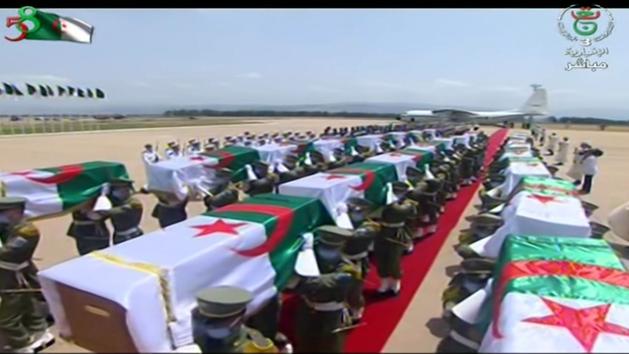Algeria buries this Sunday, July 5, the anniversary of its independence, the remains of 24 anti-colonial insurgents handed over by France in the "martyrs" square in Algiers, while the two countries seem to want to settle the painful past of the colonization.
The 24 skulls of these combatants killed at the start of French colonization in the 19th century will be buried during a solemn funeral in the cemetery of El Alia, the largest in Algeria, in the presence of President Abdelmadjid Tebboune.
Read also: In confined Algeria, the army plays the support of France
Located in the eastern suburbs of Algiers, it shelters the square of the “ martyrs of the Algerian Revolution ”, where the emir Abdelkader, hero of the first anti-French resistance, rest the great figures of the war of independence (1954- 1962) and the former heads of state.
The 24 coffins, covered with the national flag, should leave around 10:00 am the Palace of Culture, where they have been exposed since their arrival on Algerian soil on Friday, for the cemetery. A large crowd moved throughout the day on Saturday, a long queue was formed, despite the heat, to pay a last tribute to these national heroes repatriated after 170 years. Some men and women cried while meditating in front of these dead, according to images broadcast by televisions. " I came as a combatant, as an invalid in the liberation war (1954-1962), as a citizen who loved his country, " Ali Zelmat, known as "Mokhlas", told AFP. war), 85 years old. These mortuary remains have been preserved since the 19th century in the collections of the National Museum of Natural History in Paris.
To read also: "Memory and war of Algeria: the political risk of a historical trap"
Colonized for 132 years (1830-1962), Algeria officially requested the handing over of skulls - several dozen - and colonial archives in January 2018.
Among the most illustrious rebel heads of early colonization are those of Sheikh Bouziane, the leader of the Ziban insurrection in eastern Algeria in 1849, and his comrades in arms. Captured by the French, they were shot and then beheaded. Skulls were considered " war trophies " by the French military.
"Another step"
Their return by France is a strong sign of a thaw in relations between Algeria and the former colonial power, marked since 1962 by recurrent controversies and tensions. " This gesture is part of a process of friendship and lucidity on all the wounds of our history ", commented this Friday July 3 Elysée.
During a visit to Algiers in December 2017, French President Emmanuel Macron undertook to return the Algerian human remains stored at the Musée de l'Homme, one of the sites of the National Museum of Natural History. The same year, but before his election, he called the colonization of Algeria in Algiers a " crime against humanity ".
Read also: Macron and Algeria: the quicksands of memory repentance
The memory issue remains at the heart of the conflictual relations between France and Algeria, where the perception is that France is not doing enough to repent of its colonial past. Interviewed this Saturday July 4 by the international channel France 24, President Tebboune estimated that it was necessary "to face the problem of the Memory which mortgages many things in the relations between the two countries ". As for possible excuses from Paris, Tebboune replied: “We have already received half-excuses. We must take another step (...) We want to. ” " This will make it possible to calm the climate and make it more serene for economic relations, for cultural relations, for neighborhood relations ", he explained.
Read also: The hidden truths of the Algerian war, by Jean Sévillia
Algerian deputies have just adopted a " historic " law establishing a Day of Remembrance, May 8, in memory of the 1945 massacres committed by French forces in Sétif and in Constantinois (east).
Algiers also wants to put on the table the file of the " disappeared " during the war of independence (1954-1962) - more than 2200 according to Algiers - and that of the French nuclear tests in the Algerian Sahara which " have done and continue to make victims ”.

